Results
-
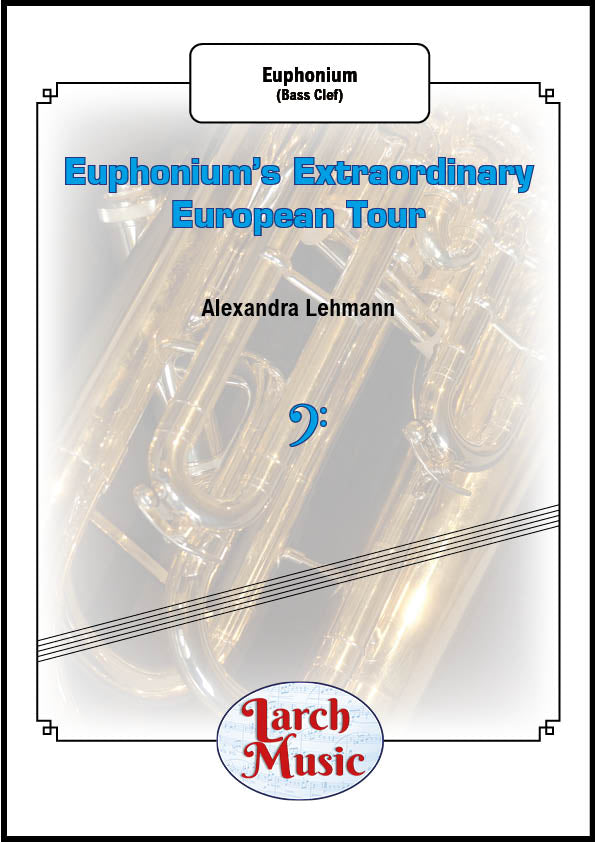 £9.95
£9.95Euphonium's Extraordinary European Tour - Solo Euphonium (Bass Clef) - LM171
COMPOSER: Alexandra LehmannEuphonium's Extraordinary European TourThe year 2020 will be infamously recorded as a time when musicians had to lead a solitary life, which is incompatible with musical activity.Furthermore, I wanted to offer an experience of travelling in Europe through music.There is a wealth of historical, and traditional European monophonic music.Hence, the Tour is based around the 14th-15th centuries whenEuphoniumencounters different musical cultures.The Tour is dedicated to my father, mother, brother, and sister;Jean-Pierre, Francoise, Fabrice, and Mahaut Lehmann;with whom I was fortunate to travel in my youth.CONTENTS1. Ostentatious OvertureEuphoniumis at the French palace of Versailles with all itspomp, splendour, and magnificence.2. Mystical MinnesangerEuphoniumhas travelled to the Holy Roman Empire, where he isperforming an ode to a Germanic Knight.3. Andalusian NightsThe Caliphate of Cordoba was a mixing-pot of Islamicand Judaic music. What is fascinating is that many of the ideas aroundperformance; modes at certain times of the day, improvisation into metred,faster sections; go back to the Indian subcontinent and even furtherback into Ancient Greece.Euphonium is chanting for theCaliphate on a warm summer's evening.4. Tarantella of the TagliatelleI don't know if the Medici family ate tagliatelle,but if they did, this joyful and lively tarantella is whatEuphonium would have played.5. Terrifying TropakA complete change of mood.Euphonium is playing for a swashbucklingperformance of Ukrainian Cossacks, with leaps, stamps, and twirls.6. Sami Herding SongIn the Arctic Norwegian north,Euphonium is with the Sami calling theirherd of reindeers with vocalisations that echo in the icy distance.7. Highland FlingEuphoniumis in Scotland taking part in the Highland Games.Female dancers perform athletic jumps.8. Royal Festive FanfareEuphoniumfinishes his European Tour at Windsor Castle, England.Like the natural trumpet (played at the time), the lower range is based on the first notes of the harmonic scale and announce the entry of the royal family.
In Stock: Estimated dispatch 3-5 working days
-
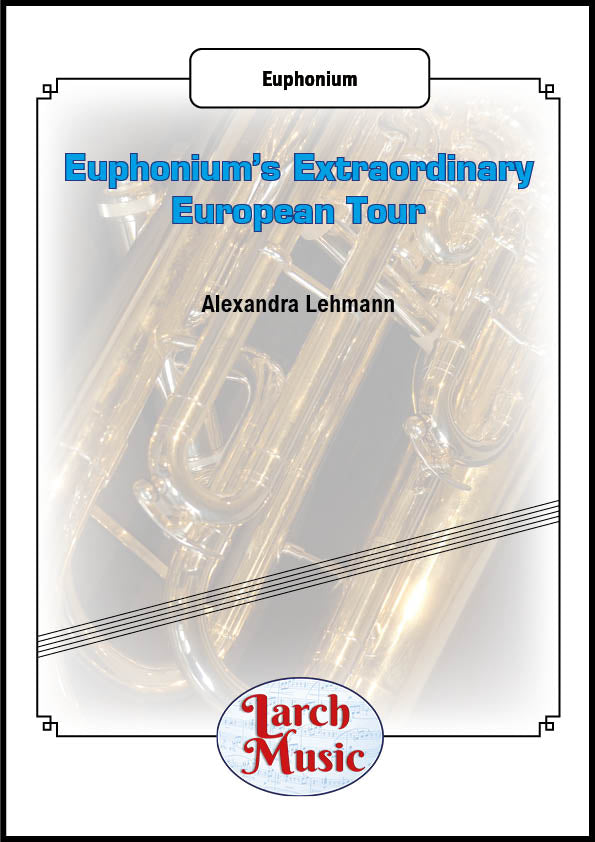 £9.95
£9.95Euphonium's Extraordinary European Tour - Solo Euphonium (Treble Clef) - LM168
COMPOSER: Alexandra LehmannEuphonium's Extraordinary European TourThe year 2020 will be infamously recorded as a time when musicians had to lead a solitary life, which is incompatible with musical activity.Furthermore, I wanted to offer an experience of travelling in Europe through music.There is a wealth of historical, and traditional European monophonic music.Hence, the Tour is based around the 14th-15th centuries whenEuphoniumencounters different musical cultures.The Tour is dedicated to my father, mother, brother, and sister;Jean-Pierre, Francoise, Fabrice, and Mahaut Lehmann;with whom I was fortunate to travel in my youth.CONTENTS1. Ostentatious OvertureEuphoniumis at the French palace of Versailles with all itspomp, splendour, and magnificence.2. Mystical MinnesangerEuphoniumhas travelled to the Holy Roman Empire, where he isperforming an ode to a Germanic Knight.3. Andalusian NightsThe Caliphate of Cordoba was a mixing-pot of Islamicand Judaic music. What is fascinating is that many of the ideas aroundperformance; modes at certain times of the day, improvisation into metred,faster sections; go back to the Indian subcontinent and even furtherback into Ancient Greece.Euphonium is chanting for theCaliphate on a warm summer's evening.4. Tarantella of the TagliatelleI don't know if the Medici family ate tagliatelle,but if they did, this joyful and lively tarantella is whatEuphonium would have played.5. Terrifying TropakA complete change of mood.Euphonium is playing for a swashbucklingperformance of Ukrainian Cossacks, with leaps, stamps, and twirls.6. Sami Herding SongIn the Arctic Norwegian north,Euphonium is with the Sami calling theirherd of reindeers with vocalisations that echo in the icy distance.7. Highland FlingEuphoniumis in Scotland taking part in the Highland Games.Female dancers perform athletic jumps.8. Royal Festive FanfareEuphoniumfinishes his European Tour at Windsor Castle, England.Like the natural trumpet (played at the time), the lower range is based on the first notes of the harmonic scale and announce the entry of the royal family.
In Stock: Estimated dispatch 3-5 working days
-
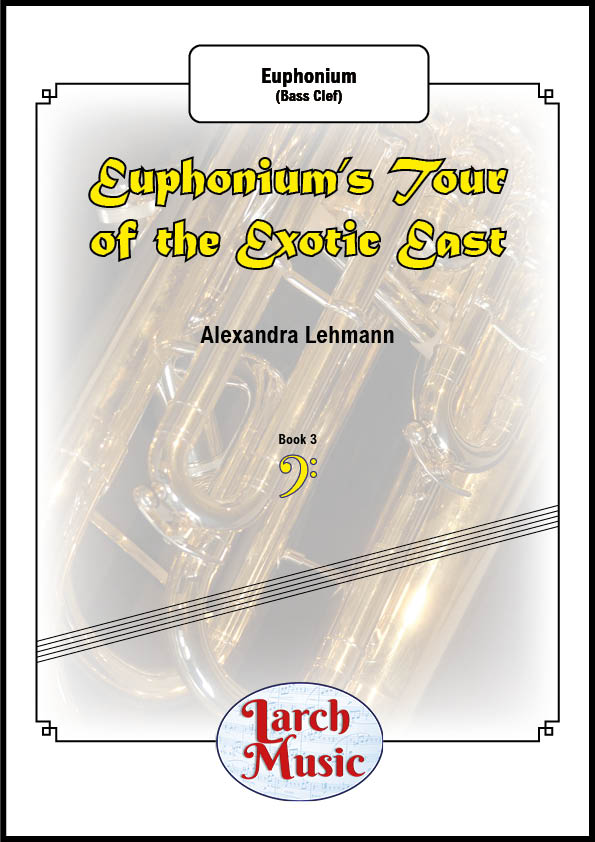 £9.95
£9.95Euphonium's Tour of The Exotic East - Solo Euphonium (Bass Clef) - LM173
COMPOSER: Alexandra LehmannEuphonium's Tour of The Exotic EastThe year 2020 will be infamously recorded as a time when musicians had to lead a solitary life, which is incompatible with musical activity.1. Dynamic Dabkeh DanceEuphoniumplays for a 'Dynamic Dabkeh Dance' in the Levant,where dancers dance energetically in a circle to celebrate a wedding.2. Slithering Snake Charmer's Sinuous ChantEuphoniumplays a 'Sinuous chant for a Slithering Snake' as asnake-charmer in the Indian subcontinent.The slithering snake undulates in response to the raga-infused melody.3. Merry MadagascarEuphoniumtravels south-east to the island of Madagascarwhere here is a village harvest Carnival,with much merriment and communal music.4. Lively and Luxurious Lion DanceFurther north,Euphonium participates in the Far Easternlively and luxurious Lion Dance to bring good luck and fortune.5. Indonesian GamelanEuphoniummust hurry to Indonesia where there is anIndonesian Gamelan puppet whole-tone scale musical performance,with chiming large gongs, and fast clattering metallophones.6. Polynesian PartyEuphoniumtakes the boat to the Polynesian Islandsto play at a Party celebrating the sea.7. Anthem to the ChrysanthemumFinally,Euphonium goes up north again and plays homagewith an Anthem to the mystical Chrysanthemum with a pentatonic melody representing happiness, love, longevity, nobility, and joy.
In Stock: Estimated dispatch 3-5 working days
-
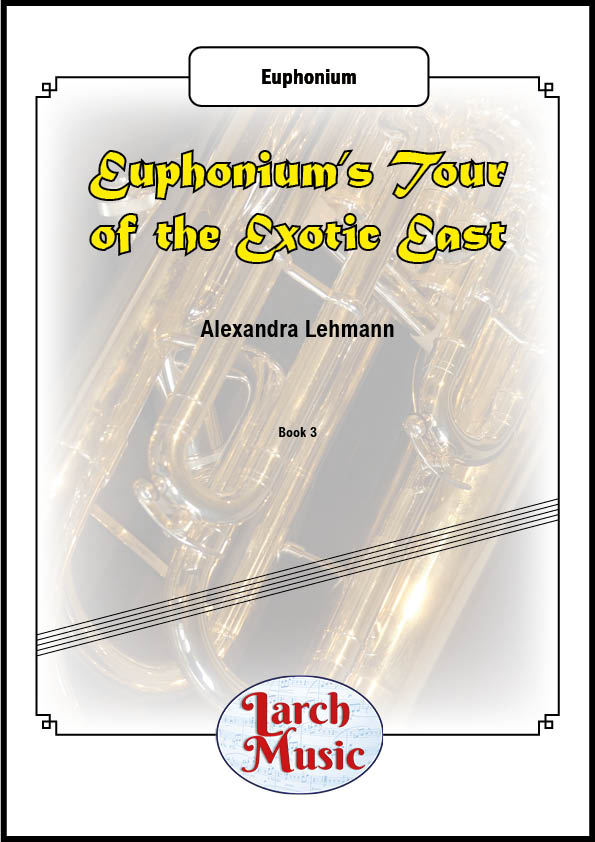 £9.95
£9.95Euphonium's Tour of The Exotic East - Solo Euphonium (Treble Clef) - LM170
COMPOSER: Alexandra LehmannEuphonium's Tour of The Exotic EastThe year 2020 will be infamously recorded as a time when musicians had to lead a solitary life, which is incompatible with musical activity.1. Dynamic Dabkeh DanceEuphoniumplays for a 'Dynamic Dabkeh Dance' in the Levant,where dancers dance energetically in a circle to celebrate a wedding.2. Slithering Snake Charmer's Sinuous ChantEuphoniumplays a 'Sinuous chant for a Slithering Snake' as asnake-charmer in the Indian subcontinent.The slithering snake undulates in response to the raga-infused melody.3. Merry MadagascarEuphoniumtravels south-east to the island of Madagascarwhere here is a village harvest Carnival,with much merriment and communal music.4. Lively and Luxurious Lion DanceFurther north,Euphonium participates in the Far Easternlively and luxurious Lion Dance to bring good luck and fortune.5. Indonesian GamelanEuphoniummust hurry to Indonesia where there is anIndonesian Gamelan puppet whole-tone scale musical performance,with chiming large gongs, and fast clattering metallophones.6. Polynesian PartyEuphoniumtakes the boat to the Polynesian Islandsto play at a Party celebrating the sea.7. Anthem to the ChrysanthemumFinally,Euphonium goes up north again and plays homagewith an Anthem to the mystical Chrysanthemum with a pentatonic melody representing happiness, love, longevity, nobility, and joy.
In Stock: Estimated dispatch 3-5 working days
-
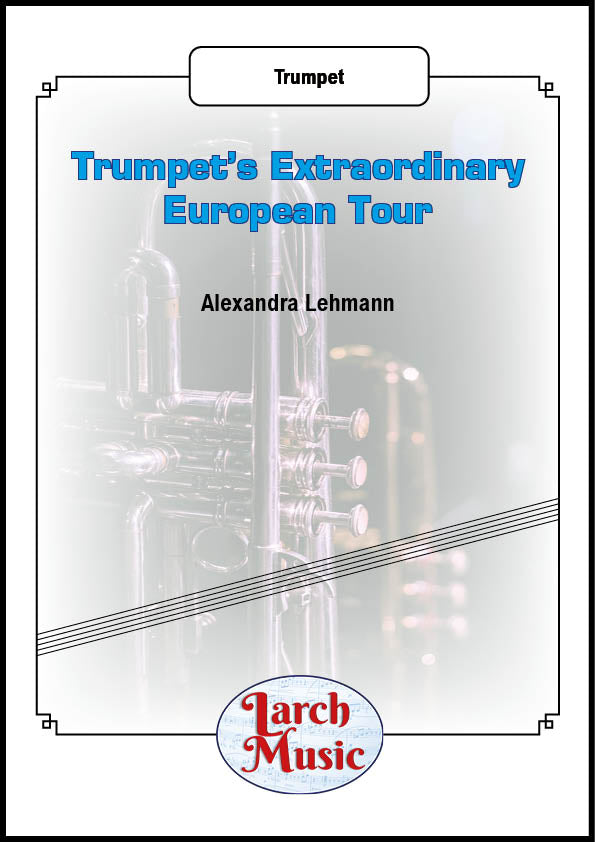 £9.95
£9.95Trumpet's Extraordinary European Tour - Solo Trumpet - LM186
COMPOSER: Alexandra LehmannTrumpet's Extraordinary European TourThe year 2020 will be infamously recorded as a time when musicians had to lead a solitary life, which is incompatible with musical activity.Furthermore, I wanted to offer an experience of travelling in Europe through music.There is a wealth of historical, and traditional European monophonic music.Hence, the Tour is based around the 14th-15th centuries whenEuphoniumencounters different musical cultures.The Tour is dedicated to my father, mother, brother, and sister;Jean-Pierre, Francoise, Fabrice, and Mahaut Lehmann;with whom I was fortunate to travel in my youth.CONTENTS1. Ostentatious OvertureTrumpet is at the French palace of Versailles with all itspomp, splendour, and magnificence.2. Mystical MinnesangerTrumpethas travelled to the Holy Roman Empire, where he isperforming an ode to a Germanic Knight.3. Andalusian NightsThe Caliphate of Cordoba was a mixing-pot of Islamicand Judaic music. What is fascinating is that many of the ideas aroundperformance; modes at certain times of the day, improvisation into metred,faster sections; go back to the Indian subcontinent and even furtherback into Ancient Greece.Trumpetis chanting for theCaliphate on a warm summer's evening.4. Tarantella of the TagliatelleI don't know if the Medici family ate tagliatelle,but if they did, this joyful and lively tarantella is whatTrumpet would have played.5. Terrifying TropakA complete change of mood.Trumpet is playing for a swashbucklingperformance of Ukrainian Cossacks, with leaps, stamps, and twirls.6. Sami Herding SongIn the Arctic Norwegian north,Trumpet is with the Sami calling theirherd of reindeers with vocalisations that echo in the icy distance.7. Highland FlingTrumpetis in Scotland taking part in the Highland Games.Female dancers perform athletic jumps.8. Royal Festive FanfareTrumpetfinishes his European Tour at Windsor Castle, England.Like the natural trumpet (played at the time), the lower range is based on the first notes of the harmonic scale and announce the entry of the royal family.
In Stock: Estimated dispatch 3-5 working days
-
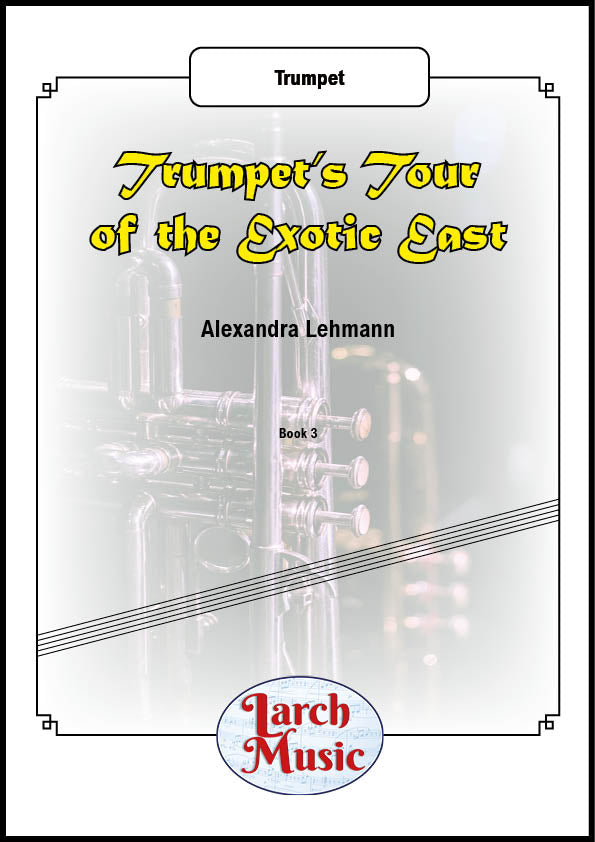 £9.95
£9.95Trumpet's Tour of The Exotic East - Solo Trumpet - LM188
COMPOSER: Alexandra LehmannTrumpet's Tour of The Exotic EastThe year 2020 will be infamously recorded as a time when musicians had to lead a solitary life, which is incompatible with musical activity.1. Dynamic Dabkeh DanceTrumpetplays for a 'Dynamic Dabkeh Dance' in the Levant,where dancers dance energetically in a circle to celebrate a wedding.2. Slithering Snake Charmer's Sinuous ChantTrumpetplays a 'Sinuous chant for a Slithering Snake' as asnake-charmer in the Indian subcontinent.The slithering snake undulates in response to the raga-infused melody.3. Merry MadagascarTrumpettravels south-east to the island of Madagascarwhere here is a village harvest Carnival,with much merriment and communal music.4. Lively and Luxurious Lion DanceFurther north,Trumpet participates in the Far Easternlively and luxurious Lion Dance to bring good luck and fortune.5. Indonesian GamelanTrumpetmust hurry to Indonesia where there is anIndonesian Gamelan puppet whole-tone scale musical performance,with chiming large gongs, and fast clattering metallophones.6. Polynesian PartyTrumpettakes the boat to the Polynesian Islandsto play at a Party celebrating the sea.7. Anthem to the ChrysanthemumFinally,Trumpet goes up north again and plays homagewith an Anthem to the mystical Chrysanthemum with a pentatonic melody representing happiness, love, longevity, nobility, and joy.
In Stock: Estimated dispatch 3-5 working days
-
 £23.50
£23.50A Brussels Requiem - SCORE ONLY - Bert Appermont
The attacks in Brussels on 22 March 2016 created a shockwave throughout Belgium and the rest of the world. Equally, the attacks in Paris and Nice led to great public indignation, fear and disbelief. What has happened to the western world? Have our cultures grown apart to such an extent that we do not understand each other anymore? Bert Appermont's intention was to voice certain emotions that these acts of terror have caused: particularly fear, grief, anger, and helplessness. He uses the French children's song Au Claire de la Lune as a connecting thread throughout the work. This piece is also about hope and faith in another world, and is meant to pay homage to all victims, resulting in a dignified remembrance. The musical development is presented in four through-composed parts, titled Innocence, In Cold Blood, In Memoriam - We Shall Rise Again and A New Day. This work was commissioned by the Brassband Oberosterreich (Brass Band Upper Austria) to be played at the European Brass Band Championships 2017.
Estimated dispatch 5-14 working days
-
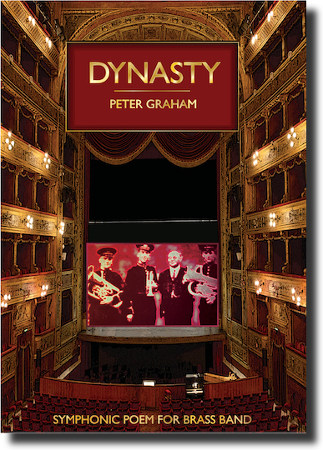 £124.95
£124.95Dynasty - Peter Graham
'Dynasty' was a joint commission for the 2019 British Open and Belgium Championships, and pays homage to the iconic figure of Harry Mortimer through a series of linked narrative passages using his autobiography as a musical point of reference.First heard to widespread acclaim at Symphony Hall, the work will make its European contest premiere at the Belgian National Championships later this year.
Estimated dispatch 3-5 working days
-
 £58.70
£58.70Into the Unknown - From Frozen II - Kristen Anderson-Lopez - Haakon Esplo
Composers Kristen Anderson-Lopez and Robert Lopez have once again written music for Disneys sequel film Frozen II after great success in 2013 with Frozen.Many will probably remember Let it Go which became a big hit from this movie.The new movie continue to follow the main character Elsa, who sings her amazing musical number "Into the Unknown" in Frozen II. The song describes Elsa's inner conflict of choice to leave Arendelle or trace the source of a mysterious voice she continues to hear.The song is originally sung by Idina Menzel and the Norwegian artist Aurora and has elements and motifs inspired by Scandinavian herding calls. As always, the music is both magnificent and captivating and will surely be a hit for many years to come.
Estimated dispatch 5-14 working days
-
 £65.00
£65.00AN ELGAR PORTRAIT - D.Price
This work was composed in commemoration of the 150th Anniversary of the birth English Composer Sir Edward Elgar. The suite is in three movements: 'Introduction', 'Elegy' and 'March', each of which have been inspired by three of Elgar's most celebrated works; Chanson de Matin, Nimrod ('Variation IX' from the Enigma Variations) and Pomp and Circumstance No.1.'Introduction' - Hollybush HillHollybush Hill is the name of one of the peaks of the Malvern Hills in Worcestershire. The Malverns were a favourite walking area for Elgar and his wife, and their panoramic views inspired much of Elgar's music.'Elegy' - BroadheathBroadheath is the small village at the foot of the Malvern Hills where Elgar was born (and lived at various times throughout his life). Elgar is buried not far from Broadheath at St Wulstan's in Little Malvern. 'March' - Worcester CathedralMany of the Worcestershire ensembles and music festivals played an important role in Elgar's early musical education. He was heavily involved in The Three Choirs Festival and either conducted or played in many of the light orchestras and vocal groups that performed at venues across Worcester. A statue of Elgar overlooks the Cathedral at the end of Worcester High Street.An Elgar Portrait has been used regularly as an own-choice test-piece for Section 4 bands, and was also selected as the set work for the Swiss National Championships in 2007 as well as the Pontins Championships in 2008. The composer has slightly reworked this piece for the Section 4 Final of the National Brass Band Championships of Great Britain 2020 and it's this version that should be performed at the contest. If bands currently have an older version in their libraries, please contact us directly for more information.
Estimated dispatch 7-14 working days






